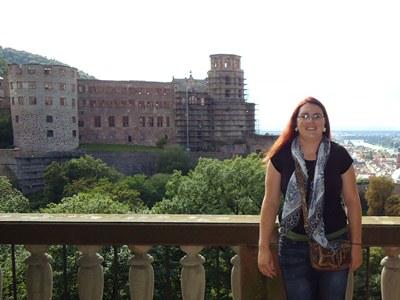A Semester in Heidelberg

 An opportunity to student teach for the Department of Defense does not come along every day. For Fay Carey, a senior at Sterling College, it was a chance that she could not pass up.
An opportunity to student teach for the Department of Defense does not come along every day. For Fay Carey, a senior at Sterling College, it was a chance that she could not pass up.
When it came time for Carey start the preparation process for student teaching, she did a Google search on places to teach overseas. Since it was her last semester, she considered that it was a time to expand her skill set and work with a diverse group of people, an experience that would prime her for the workforce. After three months of investigation, Carey settled on the most attractive option: working for the DOD on a group of bases called Headquarters Allied Force Command (HQFC) Heidelberg in Germany.
The Department of Defense Education Activity (DODEA) employs some of the most highly educated and well-vetted teachers who have come out of American universities. Carey knew that the opportunity to spend time with those teachers would shape her future as an educator, so she applied. On August 25, 2011, with a mix of trepidation and excitement, she began her trip to Heidelberg.
Once she arrived, Carey was assigned the freshman honors world history class. Far from ordinary, these students were already versed in seeing things through a global perspective. Carey was teaching the children of active military service members, contractors, and NATO personnel. Ultimately, those students would be the ones to define the greatest successes and challenges of her time at HQFC Heidelberg.
Triumphs and hardships in the classroom, Carey points out, depend partly on what the student deals with at home. Her students cope with especially difficult things.
“I got an email from the school counselor telling me to be extra sensitive to the emotions of one girl in my class because it was the one year anniversary of her father’s death in the line of duty,” said Carey. “I found myself trying to keep a sense of normalcy for these students, when really, nothing was normal.”
Carey found that children of deployed parents are more apt to underachieve, simply because their parents are not there to encourage them. Carey recalled one particular instance with a young man in her class who was slacking.
“He was having an awful day, and I just kept pushing. Finally, I took him out into the hallway and had a conversation with him regarding his academic performance. I told him I expected more out of him than what he was giving, that he was special. From that day on, he worked twice as hard. All it took was a little affirmation.”
While the classroom was a great learning experience, so was the travel. Among other trips, Carey went to London, which offered a realistic tie-in to her world history class. She found the Rosetta Stone was on display.
“We had just been talking about it in class, so I took some pictures. I got to tell my students more about the stone than I had expected to be able to. Later in that semester, five or six of my students got to go to London. They all asked me where they could go to see the Rosetta Stone.”
Carey returned on December 15 and will finish her last day of class January 19. After her Heidelberg adventure, she is looking forward to taking on the challenges of her own classroom here in America. Having reflected on her time there, Carey says that she would recommend others seek out time overseas. “It was such a great experience; it changed the way I think about life, people, and history.”
- Log in to post comments


